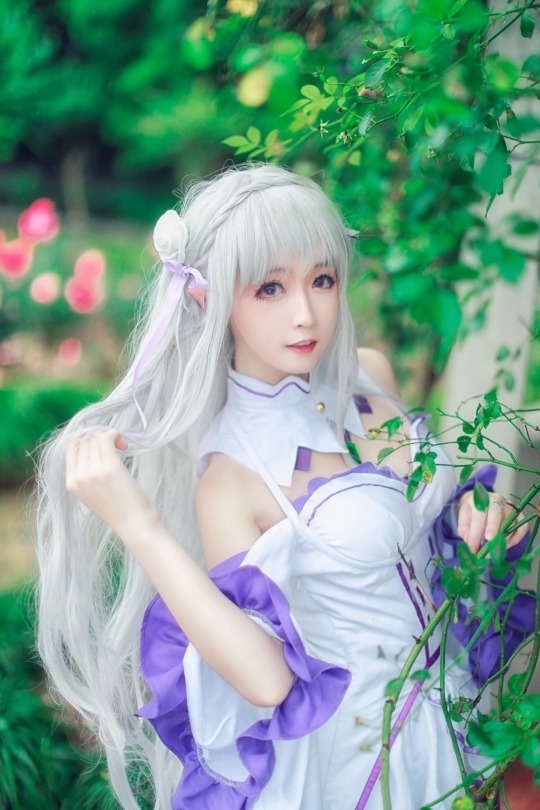#田园
Explore tagged Tumblr posts
Text
责子 - Admonishing (my) sons
by 陶渊明 (Tao Yuanming, ~365 - 427)
白发被两鬓 肌肤不复实 bái fà bèi liǎng bìn jī fū bù fù shí White hair greys both temples, skin sags, no longer firm -
虽有五男儿 总不好纸笔 suī yǒu wǔ nán ér zǒng bù hǎo zhǐ bǐ though blessed with five boys, none have love for paper and brush.
阿舒已二八 懒惰故无匹 ā shū yǐ èr bā lǎn duò gù wú pǐ A-Shu now twice eight, is so lazy none can compare.
阿宣行志学 而不爱文术 ā xuān xíng zhì xué ér bù ài wén shù A-Xuan, coming to fifteen where others pursue study, dislikes all things literary.
雍端年十三 不识六与七 yōng duān nián shí sān bù shí liù yǔ qī Yong and Duan, aged thirteen, find strangers in the numbers six and seven.
通子垂九龄 但觅梨与栗 tōng zi chuí jiǔ líng dàn mì shí lízi yǔ lì Tongzi who is nearly nine, seeks only pears and chestnuts
天运苟如此 且进杯中物 tiān yùn gǒu rú cǐ qiě jìn bēi zhōng wù Now if Heaven’s will is truly thus, drink up, whatever’s in the cup
………………………………………………………………………………………….
Notes
(translations below are all mine):
This is a homework poem - from many weeks back xD - that I’d like to share. It’s by Tao Yuanming, a poet whose lifetime spanned the late Eastern Jin Dynasty and early Liu Song Dynasty.
I really like his writing, and one thing I appreciate a lot about it is that he (usually) writes very plainly, but if we think about it a little, we can uncover hidden delights! He’s also just a very cute* person in general, which I think is what makes reading his works such a pleasure xD It also feels quite safe leaving this poem without any commentary because of the above mentioned quality of his writing - perhaps the only thing that needed some clarification was 志学, which was glossed in the translation anyway.
So! Feel free to leave a message and tell me if I’m right, and also what you spot!
Also, as Jing said in the chat, tag yourself! Which lazy kid are you? :P
Oh and Tao Yuanming is a super famous writer of the Northern and Southern Dynasties actually, so you can probably look him up very easily if you want to. I’m just trying something different with him where I want to go through all of his works, and then go snooping through other people’s writing about his life.
* I said he was very cute earlier. Here is proof in his 归园田居·其三 Retiring to Fields and Home (part three).
种豆南山下 - Planting beans ‘neath the Southern Mountains, 草盛豆苗稀 - weeds abound, while the seedlings are sparse. 晨兴理荒秽 - Rising with the dawn to cull the weeds, 带月荷锄归 - retiring with the moon and a shouldered hoe; 道狭草木长 - the paths are narrow, the grasses tall, 夕露沾我衣 - and the evening dew dampens my clothes. 衣沾不足惜 - But dampened clothes aren’t worth lamenting, 但使愿无违 - so long as my ideals and actions, aligned, remain.
When he’s in a lighthearted mood, he likes to raise his readers’ expectations or tease at something and then reveal a hilarious twist. And often it’s very good naturedly self deprecating without being disparaging or underselling himself, so you laugh with him but not at him.
For example, in an earlier part (Part Two) of the above poem, he talks about the peaceful rural retirement with down-to-earth neighbours and the things he is doing with his land. Then in part three, he starts off with a romantic-ish image only to dash it immediately with the next paired line, stated soooooo proudly. It gets funnier with every addition as you realise how hard he worked to get that result. But then there is a twist again - he says, all this and he doesn’t mind! Why not? Because it was his choice. Bro is truly committing to the unworldly farming life.
…Anyway, there are six parts to 归园田居. I highly recommend reading it all if you can because I’m totally not doing him any justice xD
For all of y’all who can read Chinese with a bit of help, here is another piece of his writing related to his kids. They make quite a number of cameos in his other poems, but I chose this one because it's actually addressed to them! He was writing in anticipation of the birth of his first son - if internet sources are to be believed.
Note: Veryyyyyyy rough, first draft-y sort of translation. I was just trying to get the meaning across as easily as possible.
命子 - Guidance for my son 悠悠我祖 爰自陶唐 邈焉虞宾 历世重光 御龙勤夏 豕韦翼商 穆穆司徒 厥族以昌 Long, long ago, my ancestor lived; Yao, who was of Tao and Tang. In the distant past, honoured at Yu, Danzhu paved glory for generations after. Surnamed Yulong, they served in Xia, as Shiwei, were wings to Shang; Great Minister over the Masses, Tao Shu led our clan’s rise.
纷纷战国 漠漠衰周 凤隐于林 幽人在丘 逸虬绕云 奔鲸骇流 天集有汉 眷予愍侯 The chaos of the Warring States, the fall of weakened Zhou; the Feng fades into his forest, hermits retire to their mountains. The Qiulong winds through cloud, whales ride monstrous waves; heaven-blessed was the coming of Han, it favoured Marquis Min.
於赫愍侯 运当攀龙 抚剑风迈 显兹武功 书誓河山 启土开封 亹亹丞相 允迪前踪 Illustrious Marquis Min; the time for him and his Emperor just arrived. Sword in hand against the wind, he achieved impressive martial feats. Fulfilling his lord's promise of everlasting glory, he was bestowed land, titles. And a tireless, diligent Chancellor followed in the footsteps of his father. 浑浑长源 蔚蔚洪柯 群川载导 众条载罗 时有语默 运因隆窊 在我中晋 业融长沙 The gushing of a river long from its source, the luxuriance of towering trees; all streams began from somewhere, all branches grow from some trunk. There is time to speak or be silent, for fortune has sharp vicissitudes; In our Jin at its zenith, Changsha’s brilliant achievements shined.
桓桓长沙 伊勋伊德 天子畴我 专征南国 功遂辞归 临宠不忒 孰谓斯心 而近可得 The fearsome, heroic Duke Huan of Changsha, with outstanding merits and virtue upon whom the Son of Heaven bestowed a hereditary title, leads wars in the South. Victory achieved, he retires home, unwavering despite glory and favour. Who dares say that such a heart can be easily found in recent times?
肃矣我祖 慎终如始 直方二台 惠和千里 於皇仁考 淡焉虚止 寄迹风云 冥兹愠喜 Rigorous he was, my grandfather, careful to the end as he was at the start. Fair and upright was his influence at Court; wisdom spread through his lands. Praiseworthy was my late fathers benevolence, though he sought no fame. He gave himself to Office and took both gain and loss with equanimity.
嗟余寡陋 瞻望弗及 顾惭华鬓 负影只立 三千之罪 无后为急 我诚念哉 呱闻尔泣 Lamenting my ignorance, I look to my ancestors, unable to reach their heights. I was ashamed, for despite my greying hair, alone in my family I stand. Among three thousand crimes, gravest - to leave no descendants. Over this I was deeply worried… until I heard your babbling cries.
卜云嘉日 占亦良时 名汝曰俨 字汝求思 温恭朝夕 念兹在兹 尚想孔伋 庶其企而 Observing the portents on this good day, divining this to be a good time, I named you Yan, gave you the courtesy name of Qiusi. Be respectful and aspiring day or night; remember well your name as Kong Ji remembered his. Such is my wish for you.
厉夜生子 遽而求火 凡百有心 奚特于我 既见其生 实欲其可 人亦有言 斯情无假 A diseased man’s son was born at night; with lamp and urgency he went to check. Every person, being ordinary, would have such a worry; I am no different. Witnessing your birth, truly, I wish for your future success. Though something often said by man, the sentiment in this is sincere and true.
日居月诸 渐免于孩 福不虚至 祸亦易来 夙兴夜寐 愿尔斯才 尔之不才 亦已焉哉 Days and months will pass swiftly, my son will leave childhood behind. Fortune's roots are always there, disaster also easily arrives. Be diligent: rise early, sleep late; may you be blessed with talent and success. But if you do not, then alas, though that is also fine.
(Referenced this source and this one for annotations)
I thought the intertwining of the imagined past and illustrious connections with traceable ancestors, grandparents and parents was a very charming way of expressing this narrative. Especially so when you think about the way the whole longass grandmother story is told shapes the message to his son! Noticing his efforts to emphasize the great achievements that could come about because of opportunity and fortune right after his rather soul stirring introduction (Parts 1 and 2) was DELIGHTFUL and actually very touching.
What makes a man good? Diligence, steadiness and dedication to doing what is good and right. What makes a man great? First, opportunity i.e. luck, but also, most importantly - strength of character - not losing sight of his heart despite power or fame.
All that leads up to his concluding verses - that it's human nature for parents to wish sincerely that their children will do well, so that their own regrets in life do not repeat. But the world is so unpredictable! Just do your best to lay the foundations for fortune when it arrives, then let things happen as they will, and let's be contented whatever the outcome.
Just taking his attitude at face value, what an un-stressful way to live life :D !!!!!!!!
And after reading this poem, how do you feel about Admonishing Sons that we started with in this post? GO read it again!
I love him so much.
31 notes
·
View notes
Photo
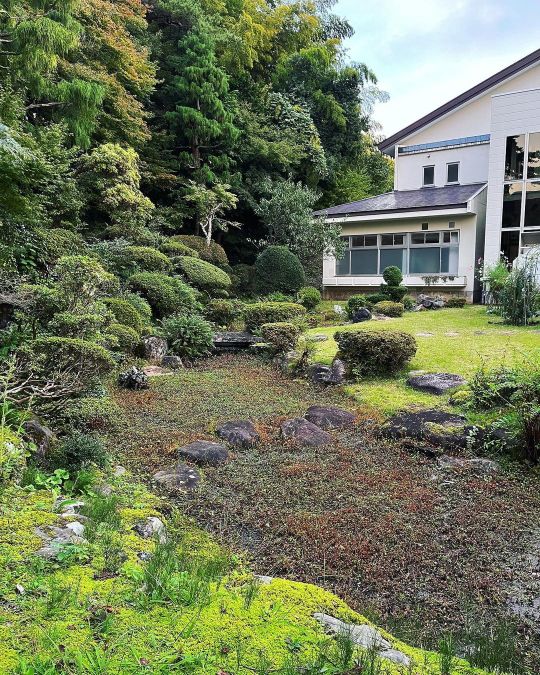
📸刈羽村老人福祉センター「ことぶき荘」庭園(新潟県刈羽村) Kariwa Village Elderly Welfare Center Garden, Kariwa, Niigata ——京都の世界遺産・銀閣寺をはじめ、日本全国各地の文化財庭園の修復に携わった作庭家 #田中泰阿弥 。 氏を育てた新潟・柏崎に庭園文化を持ち込んだ庭師 #相澤熊蔵 の現存する貴重な庭園。 京都・刈羽村老人福祉センター「ことぶき荘」庭園の紹介は☟ https://oniwa.garden/kariwamura-kotobikiso-niigata/ ———————— この庭園から伝えたいこと。 ・京都/東京以外の地域でも、「かつて江戸城に出入していた庭師」の庭園が残っている。 ・その方の弟子が、世界遺産・銀閣寺の御用達になることもある。京都出身じゃないからチャンスが無いということではない。 ・けど、そんなルーツがある庭園でも維持が難しくなってきている。 ・地方から少しずつ(加速しながら)古い日本庭園は「壊れて」いる。 都市部への人口集中問題と同じで、これは京都と東京の管理された庭園ばかり見ていたら気づけないことは多くあり、本心では【待ったなし】の状況だと思っている。 だから「残念である。」という言葉で済ませちゃダメだと、先日のnoteのコラムに繋がる。後世から見た時に「昭和平成時代の人たちは一体何をやってたんだ」と言われないためには。 ・・・・・・・・ 「刈羽村老人福祉センター ことぶき荘」は新潟県の南西部、原子発電所の立地自治体として知られる刈羽村にある福祉施設。近代に当地で活躍した庭師・相澤熊蔵が作庭した日本庭園が残ります。 京都の世界遺産&国宝『銀閣寺』の御用達庭師として当サイトでもたびたび名前を挙げる作庭家・田中泰阿弥。 氏が生まれ育った新潟県柏崎市に江戸の庭園文化を持ち込み、“刈羽柏崎の庭師の祖”と呼ばれたのが相沢熊蔵。田中泰阿弥の兄も相沢熊蔵に弟子入りしていたとか(=実質的には田中泰阿弥の“大師匠”)。 相沢熊蔵は元は幕末の江戸の出で、江戸では将軍・徳川家(=『江戸城庭園』)や大名家に出入りした庭師だったとか。 しかし幕末~明治維新期にそれまでの社会・階級が一変すると相沢熊蔵も江戸を離れ、上州前橋藩や信州松本藩の出入り庭師に。やがて��後出身の奥さんの導きで柏崎・刈羽に辿り着き、当地で“松屋の爺さん”と呼び親しまれながら作庭に励みました。 そんな相沢熊蔵が明治時代に当地の有力者・安沢氏の邸宅に作庭したのが現在の刈羽村老人福祉センター「ことぶき荘」庭園。他にも刈羽・柏���には氏の庭園が複数残るようですが、公開されているのはこちらのみという貴重な庭園。 残念ながら2005年の新潟県中越地震で水源が枯れ、現在は枯池となっていますが、心字池を中心に背後の山の斜面を活かした立派な滝石組のある池泉回遊式庭園を見ることができます。斜面にサツキ/ツツジなどが植わった江戸時代のスタイルと、この山に自生していた?自然の紅葉の双方が活かされた庭園。 池の中央には折れたままの大きな石橋がそのまま残されていて、中越地震の大きさと痕跡を生々しく感じられることができます。 「以前はもっときれいだったんですけどね」と施設の方も現状に満足しているわけではないようだったけれど、過疎高齢化の進む地方の自治体で庭園に予算を投じ続けることも簡単ではなく…(というより年々難しくなっていく)。 その中でも芝生の中で新たに山野草を育てられていたりと、新たに“ガーデン”の要素を加え地域の安らぎの場として育ち始めている様子も伺えます。お近くを訪れた際には立ち寄ってみて。 新潟・刈羽村老人福祉センター「ことぶき荘」庭園の紹介は☟ https://oniwa.garden/kariwamura-kotobikiso-niigata/ ———————— #japanesegarden #japanesegardens #japanesearchitecture #japanarchitecture #kyotogarden #zengarden #landscapedesign #japanarchitect #japandesign #jardinjaponais #jardinjapones #japanischergarten #jardimjapones #庭院 #庭园 #庭園 #日本庭園 #刈羽 #刈羽村 #kariwa #新潟 #niigata #新潟庭園 #相沢熊蔵 #おにわさん (刈羽村老人福祉センター) https://www.instagram.com/p/Cp3tqE1vflK/?igshid=NGJjMDIxMWI=
#田中泰阿弥#相澤熊蔵#japanesegarden#japanesegardens#japanesearchitecture#japanarchitecture#kyotogarden#zengarden#landscapedesign#japanarchitect#japandesign#jardinjaponais#jardinjapones#japanischergarten#jardimjapones#庭院#庭园#庭園#日本庭園#刈羽#刈羽村#kariwa#新潟#niigata#新潟庭園#相沢熊蔵#おにわさん
4 notes
·
View notes
Text
【新聞大家談】碧桂園違約 衝擊波驚人
1 note
·
View note
Text
陶渊明诗歌赏析
饮酒•其五 结庐在人境,而无车马喧。问君何能尔?心远地自偏。采菊东篱下,悠然见南山。山气日夕佳,飞鸟相与还。此中有真意,欲辨已忘言。 译文:将房屋建造在人来人往的地方,却不会受到世俗交往��喧扰。问我为什么能这样,只要心志高远,自然就会觉得所处地方僻静了。在东篱之下采摘菊花,悠然间,那远处的南山映入眼帘。傍晚时分南山景致甚佳,雾气峰间缭绕,飞鸟结伴而还。这里面蕴含着人生的真正意义,想要辨识,却不知怎样表达。 赏析: …
View On WordPress
0 notes
Link
越南北方最有名田园花园设计单位
0 notes
Photo
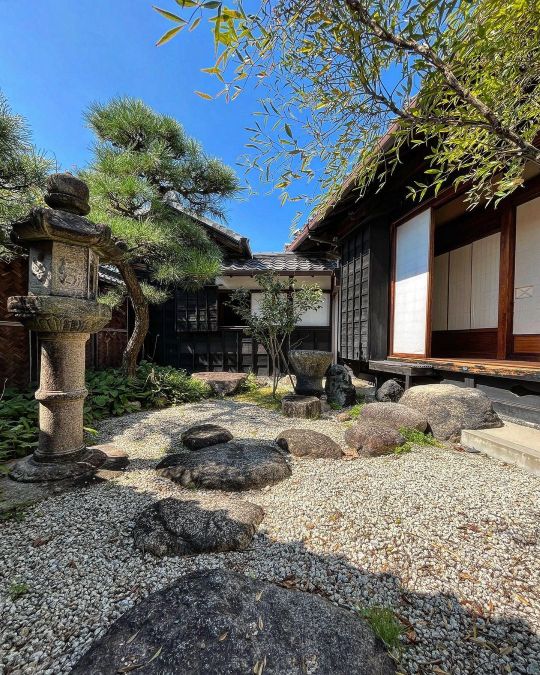
📸廻船問屋 瀧田家(愛知県常滑市) Takita-ke Residence Garden, Tokoname, Aichi ——日本航空/JAL🛫初の女性管理職でキャリアウーマンの先駆者的存在 #瀧田あゆち の生家はやきものの町・常滑の江戸時代後期の町屋。常滑市指定文化財。枯山水庭園も。 The birthplace of Ayuchi Takita, the first female manager of Japan Airlines/JAL and a pioneering career woman, is a late Edo period townhouse in Tokoname, a town of pottery. It is designated as a cultural asset by Tokoname City. There is also a karesansui (dry landscape) garden. ———————— 「廻船問屋 瀧田家」は中部国際空港セントレアのお膝元かつ歴史的な焼き物の街・常滑に江戸時代より残る商家建築。 「旧瀧田家住宅」として常滑市指定有形文化財で、日本遺産「きっと恋する六古窯」の構成文化財。日本航空(JAL)初の女性役員となった瀧田あゆちの生家でもあります。主屋・離れの前に枯山水庭園が。 2022年に国際芸術祭『あいち2022』の会場となった常滑&瀧田家。これを機に実は行ったことがなかった常滑を初めて訪れました! ▼他の写真や解説の��づきは @oniwastagram のプロフURLかこのURLから。 For more photos and commentary, please visit @oniwastagram 's profile URL or this URL. https://oniwa.garden/takitake-tokoname-aichi/ ———————— #japanesegarden #japanesegardens #枯山水 #枯山水庭園 #karesansui #japanesearchitecture #japanarchitecture #kyotogarden #zengarden #landscapedesign #beautifuljapan #japanarchitect #japandesign #jardinjaponais #jardinjapones #japanischergarten #jardimjapones #庭院 #庭园 #庭園 #日本庭園 #常滑市 #常滑 #tokoname #日本航空 #JAL #文化財 #ランドスケープ #おにわさん (廻船問屋瀧田家) https://www.instagram.com/p/CpW-ZZ4BA9A/?igshid=NGJjMDIxMWI=
#瀧田あゆち#japanesegarden#japanesegardens#枯山水#枯山水庭園#karesansui#japanesearchitecture#japanarchitecture#kyotogarden#zengarden#landscapedesign#beautifuljapan#japanarchitect#japandesign#jardinjaponais#jardinjapones#japanischergarten#jardimjapones#庭院#庭园#庭園#日本庭園#常滑市#常滑#tokoname#日本航空#jal#��化財#ランドスケープ#おにわさん
1 note
·
View note
Text




短视频上热门真的能涨粉吗 做抖音短视频怎么快速涨粉 抖音田园风短视频怎么涨粉 短视频创业内容涨粉防骗
自媒体运营工具导航 下单地址:https://dincodex.com 提高你自媒体的涨粉变现能力
0 notes
Photo



Zhang Qiuju(张秋桔 Chinese, b.1973)
1. 田园牧歌 220cmX195cm via 2. 下党春风 240×195cm via 3. unknown via more
193 notes
·
View notes
Note
Hi Orion! I was hoping you could clarify something for me and others!
Wei Wuxian’s name is from a poem right? Like I think I remember seeing something about that ages ago, that MXTX is a massive literature nerd and like 85% of MDZS is named after some sort of poem or another, which is part of what makes the ship name and song name of Wangxian fun as its yet another allusion there. I can’t find all of my sources anymore, and what with more stuff going around, I thought it would be good to get that back out in the wild.
I really loved the feeling of her paying homage to different works of art that she loves in MDZS, so I’m hoping this is still the case that what I saw ages ago is true. Cause Cloud Recesses is also like that too, right?
Hello dear Sangsang!
Wei Wuxian's name is an homage to Xu Ben! He was noted for his poetry and calligraphy arts. On a tangent his life was fairly interesting as he and his companions were of gentry and during his time it was integral to commingle with Buddhist institutions as they were the epicenter for literati. And Xu Ben was noted to be one of the literary greats for chinese poetry and their heavy emphasis of doaist confucian buddhism. He had also stepped away from deep politics for the life of a monk as did several of his other contemporaries.
But, on to the actual poem, which serves nicely on it's own for an inspiration piece for Wei Wuxian as a character. The verse his secondary name references is the final stanza:
《闲居》
明代 徐贲
谢事返丘壑,退耕理田园。
兹心获遂初,稍得酒中悁。
振策升崇褵,扬舲溯长川。
惊湍信汩汩,清溜自涓涓。
新兰艳迟日,密竹曳丛烟。
东馆朝燕坐,西林暮独还。
朋旧固云旷,山水聊夤缘。
居諠暂亦遣,习静久乃便。
已幸驻灵药,复能��瑶编。
既无羡鱼志,外物非所迁。
Leisure
Ming Dynasty Xu Ben
(1) I have returned to this valley, to till the grain and fields.
My heart has settled, drunkenly with wine.
The spirit of the throne has been revitalized, and the boats drift down the Yangtzhe River.
Orchids are colored by the late sun, bamboo thickets dense as smoke.
I sit and watch the swallows from the eastern hall, (2) as I return with the dusk from the forest .
Old friends drift like clouds, (3) I'd like to chat about the scenery*.
It helps to live in noise, we learn to sit silently.
(4) For I've been blessed with an elixir, to compromise and turn.*
(5) l do not desire to envy the fish, for the unknown cannot be moved.
This does contain several idioms
1: Lit: return to the mountain gulch after giving up one's work, retire to the farm and tend the fields. A.K.A. I retired and really don't know, mind my own business
2: Lit. Return from the West Forest at dusk. The end of one's life
3: Lit. Scenery, water from the mountain. To ingratiate oneself to another by fawning
4: Lit. Restore the ability to satirize Yao and compile it. To forgive and forget, able to recover and make light of
5: Lit. have no ambition to be envious of fish, nothing outside is worthwhile. Wú xiàn yú zhì Do not envy and aspire to be the fish. Do not envy others or aspire just for monetary gain
Piece it together and it starts to sound a bit like the ending Wei Wuxian was able to achieve after a lot of hard work and trappings of the world.
#mdzs#mo dao zu shi#wei wuxain#hmggggg translation is hard for classic poetry and I am definitely not a poet
94 notes
·
View notes
Text
[CN] Ambitious Wheat/麦野心曲 & Yunmeng Eyot Herder/牧云梦洲
🐑"The wind blows the wheat waves, the pastoral songs are melodious, Weiyin Pastoral holds a limited-time fairy tale "Windmill Song" theme event, come and join your friends~"
🐑Event Sets.
૮꒰ ˶• ༝ •˶꒱ა



૮꒰ ˶• ༝ •˶꒱ა
OG: "风吹麦浪,牧歌悠扬,维茵田园举办限时童话故事《风车之歌》主题活动,快来和朋友们一起参加吧~"
#love nikki#love nikki dress up queen#love nikki future suits#love nikki cn#NEED#i dont really understand the names tbh#i just use a dictionary
11 notes
·
View notes
Text
Wei Wuxian's Name - The Meaning of Wuxian
C Fans think this is likely the poem behind his name. And after analysing this poem, I think this is also the inspiration behind his character. OMG MXTX YOU’RE A GENIUS 😍.
Before I start, please inform me if you want to use this meta. This analysis is solely mine in every shape and form. There is only 1 Chinese interpretation online and it’s done with Baidu’s MTL. And if I do allow you to use it, PLEASE link it back to me because there’s a very high chance that I will refine this. This is the only translation/meta that I’m particular about so please respect my wishes. 🙏
The term “Wuxian” comes from the Ming Dynasty poem “Living Alone 闲居” by the poet Xiu Ben 徐贲. Sadly, there isn’t much information about the context so I’ve tried to interpret this to the best that I can. There are so many aspects in mdzs/cql that are reflected in his poem.
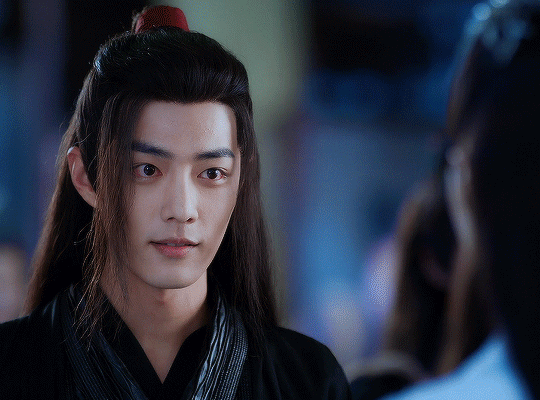
谢事返丘壑,退耕理田园。
To retire to the hills, to return to farming and prepare the land.
谢事 - To retire and get rid of mundane things, or to die
丘壑 - Hills and ravines. A secluded place in the mountains. A metaphor for somewhere far away.
退耕 - To resign from government service and to return to farming OR to convert land that was used for farming back to other use.
兹心获遂初,稍得洒中悁。
His compassionate heart has attained his wish, and slowly loses itself to anxiety in wine.
兹心 - I think this is related to 慈悲心 which refers to the concept of Compassion in Mahayana Buddhisim. 慈 refers to giving others happiness.
遂初 - This means attained his wish. OR to leave a government post and return to seclusion
悁 - This refers to anger, anxiety and melancholy.
(T/N: 获 and 得 both means to gain, so the poet is emphasising what he has gained)
振策升崇巘,扬舲溯长川。
Whipping the horse (or urging) to ascend the lofty mountain, sailing against the river that never ends
振策 - This term also means to urge or to push someone forward
长川 - It either describes a river OR something that’s never ending.
(T/N: some websites use the word 巘 (mountain), but others use 褵 (a marriage veil). I don’t have enough info, so I’ve gone with the mountain translation.)
惊湍信汨汨,清溜自涓涓。
The water gurgles flows steadily and swiftly, the crystal clear water from the small stream trickled slowly naturally.
(T/N: 汨汨 and 涓涓 are both sounds of the water flowing. 汨汨 refers to gurgling, 涓涓 flows slowly)
新兰艳迟日,密竹曳丛烟。
The new orchid blooms in spring, the dense growth of bamboo gather as they sway like the mist.
迟日 - this could mean late, or spring
烟 - This likely refers to 烟云 (literally translated to mist and cloud), but it also refers to a hermit deep within a faraway mountain.
东馆朝燕坐,西林暮独还。
To meditate in the morning the temple in Chang an, to return from the temple alone at dusk
东馆 - This either refers to the Eastern Temple, or a temple nearby Chang an. The dictionary says it’s 豫中 ‘Yuzhong Temple’ (term was used specifically the Han Dynasty), but I can’t find which temple it is specifically. LOL
西林 - This term does refer to the Xilin temple on Mount Lu. But subsequently it was referred to temples in general. As this a more modern poetry (aka Ming Dynasty), I’ve opted to use ‘temple’ instead.
(T/N: there’s a dawn to dusk imagery in this line, from 朝 (morning) to 暮 (dusk))
朋旧固云旷,山水聊夤缘。
Old friends are resolute and vast as the clouds, and to sit beneath the mountain and rivers to chat about establishing connections.
云 - The imagery of ancient clouds in ancient poetry is uh, not exactly regarded as a good thing. It’s usually related to sadness, or something that’s fickle (ie. a cloud is fickle, it changes shape whenever it wants to, sometimes you see it, and sometimes you don’t.
夤缘 - this means to climb up, establish connections and building relationships)
(T/N: This whole line is interesting and filled with contradictions. 固 refers to something resolute, but 云旷 means vast as the clouds. Of which, clouds symbolise something that’s anything but resolute. And in the second part, 聊 usually refers to a causal chat or even gossip, but 夤缘 refers to using connections to climb higher.)
居喧暂云遣,习静久乃便。
the noise at where I'm at at has stopped for now, dissipating like the wind. And so, the quiet life has persisted for long time.
居 - there are various meanings to this. The most common meaning is to stay/current location so I’ve gone with that
便乃 - this means “hence” or “so”
已幸驻灵药,复能讽瑶编。
It’s already lucky that the magical drug has rooted itself here, and I can memorise the precious books repeatedly
驻 - This is a very interesting word because it’s usually used to mean to garrison or to come to a standstill. It isn’t usually
复 - Repeatedly
讽 - This word usually means to or to mock. But I think it’s used as 讽书 in this case, which is to memorise.
既无羡鱼志,外物非所迁。Even if there isn’t any wishful thinking, the things outside are inhospitable and ever changing
无 - This means no.
羡鱼 - Wishful thinking. This is where Wei Wuxian’s name comes from (MXTX uses 无羡 instead of 羡鱼). This term comes from the idiom “临渊羡鱼,不如退而结网” which literally means, “instead of standing by the water to dream about catching fish, you should go home to make a net to actually catch a fish.” (ie. instead of being envious about another person’s achievements, we should put in the effort) So yes, Wei Wuxian does mean “do not (无) think wishfully and covert over the achievement of others” (羡)
非所 - Inhospitable, where someone cannot live normally
迁 - this means ever changing.
MY ANALYSIS
SO I HAVE SO MUCH FEELS. I believe that MXTX based some parts of Wei Wuxian’s behaviour according to this poem. Allow me to do a line by line analysis.
1st line: “To retire to the hills, to return to farming and prepare the land” - is this why our boy has such a fascination with retiring from his “post” and returning to the simple life? It’s interesting that the terms in this poem repeatedly emphasises on ‘retiring from government.” You could say that wwx’s life, starting from the time that he was a Jiang Clan disciple, and to being a soldier was a form of a post. So the author sets up the stage of what he thinks to “retire” is. And the “hills and the mountains” suggest a secluded far away. IDK about you but it screamed Cloud Recesses to me.
2nd line: “His compassionate heart has attained his wish,” - AGAIN I could scream about this. I feel that Wei Wuxian does embody the concept of “慈悲” in the simple sense of the word. “慈” as in compassionate. He brings joy to people around him and cares for others around him. 悲 as in sadness; he feels the suffering around him and hence he tries to deliver people from it. This is obviously demonstrated when he tries to save the Wen Clan. This line also emphasises that retiring away from all things political is what he wants. And the second part “slowly loses itself to anxiety in wine”, sadly he does this ever so frequently in the novel and almost amplified in CQL.
Line 3 and 4: “Whipping the horse (a metaphor for quickly, almost urgently) to ascend the lofty mountain, sailing against the river that never ends” “The water gurgles flows steadily and swiftly, the crystal clear water from the small stream trickled slowly naturally.” - in Line 3, the first part “ascending the lofty mountain, almost urgently so” reminds me of how he attained his ghost cultivation so quickly over a span of 3 months. And “sailing against the river that never ends” sounds very much like how he was always moving against the criticism of the masses in his first and second life. The lines about the water gurgling and trickling feels that the tide was always against him, be it swiftly or in small trickles.”
Line 5: “The new orchid blooms in spring, the dense growth of bamboo gather as they sway in the mist.” - the imagery of the orchid sounds a shoutout to Jinling. And the dense bamboo dusting in the mist reminds me of the parts where they were in the cold pond. I’m not sure if the CQL directors were equally inspired by this. (I can’t remember if there were bamboos in Cloud Recesses novel wise. 😂😂)
Line 6: “To meditate in the morning the temple in Chang an, to return from the temple alone at dusk” - HMM I don’t have a clear inspiration for this line unfortunately. But it could be a reference to the days spend in Cloud Recesses. The Lan 蓝 was a Buddhism references so it totally fit the bill. (I’ve mentioned it before in Taming Wangxian but if you can’t remember it, well that’s okay, I am to bring it back here eventually)
Line 7: “Old friends are resolute and vast as the clouds, and to sit beneath the mountain and rivers to chat about establishing connections.” - again the comparison of friends with clouds. It does suggest that he has a lot of friends; friends who are as fickle as clouds who aren’t there when the time calls for it. And as for the ones who are “resolute”… well we know who they are. And as for “establishing connections”, this is a common theme in the novel. It actually reminded me of JGY, who was essentially trying to curry favour to promote himself politically.
Line 8-9: “the noise at where I am at has stopped for now, dissipating like the wind. And so, the quiet life has persisted for long time.” “It’s already lucky that the magical drug has rooted itself here, and I can memorise the precious books repeatedly” lmao does the magic drug refer to the incense burner haha 😂😂 the vibe of the last two lines remind me of the end of the novel, whereby the “noise” of society has faded and he’s back to the quiet life. And as for the books that he can read, I’m guessing that’s probably referring to the Lan Family’s library
Line 10: “Even if there isn’t any wishful thinking, the things outside are inhospitable and ever changing” this is WWX and the moral of the story I guess?
(There were about 60 different references and I'm too lazy to link them all lol. They were mostly dictionary links or other poems that used the words in a similar manner. If you want a reference for a particular phrase, please let me know. XD)
In case you missed it, I’ve also analysed Wei Ying previously.
Additional Meta
More MDZS Meta
Meaning of Wei Ying
184 notes
·
View notes
Text
luke’s proposal card: poem analysis
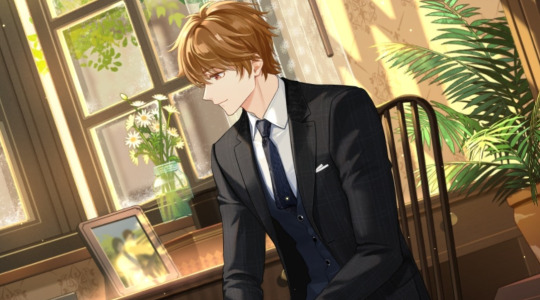
The poem that features prominently in Luke’s proposal card is a translated version of “Heimweg vom Fest” by Hermann Hesse. This post will have some translations about the poem and discuss how it suits Luke’s proposal.
My usual disclaimers apply for any of my translations here. Check my masterlist for more translations and analysis. Please also note that the original language of the poem is German, so I’ll be referencing other people’s translations of it.
Background
I found the Big Data Lab entry for the poem in Luke’s proposal card, which I had previously translated as “Going Home After the Holidays” and was unable to find the source for. Here’s the BDL entry + my translation of it.
《节庆后回家》,是由德国诗人赫尔曼,黑塞于1913年创作的诗歌,收录于诗集《孤独者的音乐》中,1914年由海尔布隆Eugen Salzer出版社出版。 原文写作“但要么至善要么至恶——可怜的灵魂恰恰喜好,或是痛苦,或是欢乐——因为它只为燃烧而燃烧。夏彦母亲在引用时,进行了略微的修改。
“Going Home After Festivities” is a poem written in 1913 by the German poet Hermann Hesse. It was included in his collection of poems titled “Songs of the Lonely”, published in 1914 by the Heilbronn publisher Eugen Salzer. The original text reads, “[the four lines of the poem which comprise the last stanza]”. When Luke’s mother quoted it, she made some slight changes.
I’ll get to the actual content of those four lines soon, but that last stanza is what appears in the game and reappears for the BDL entry. It seems to use the translation by Lin Ke (林克) that appears in Herman Hesse Selected Poems (黑塞诗选), published 2017 by Sichuan People’s Publishing House (四川人民出版社). Although the BDL entry states that Luke’s mother changed it, the only difference I saw in what appeared in the card story was the omission of “But” at the start of where she quotes.
Translation
You can find the original German text here, along with an English translation “The way home after celebration” by Sharon Krebs and a French translation by Pierre Mathé). Below is the last stanza in English:
The poor soul wishes to cherish
Only the most evil and the best,
Be they agonies, be they celebrations --
For [the soul] glows for the sake of glowing.
@enheduanna-bfv also found the German version of the poem, and would translate the title as "On the way home from a feast".
And finally, here’s the Chinese translation that seems to be the same version used in the game, alongside my translation of it (possibly influenced by Krebs’s). Please note that differences in translation could be due to different interpretations or errors at any step of translation, especially my own.
节庆后回家 Going Home After Festivities
又一个节日响成了碎片, Yet another holiday splinters with a sound.
恐惧令人窒息,我蹒跚 In suffocating fear, I stagger
走过冰雪覆盖的农田,across the frozen-over farmlands,
害怕再也回不到家园。fearing I can never return home again.
你呀,缘于痛苦的沉醉,You, the intoxication that comes from pain –
喜乐的杯盏破碎之后,After the joyful cup shatters,
我愿在心里,我情愿将你 In my heart, I’m willing to
当成半是欢喜来承受。endure you as a half-joy.
但要么至善要么至恶—— But the greatest good, or greatest evil –
可怜的灵魂恰恰喜好,it’s just what the sorry soul is after.
或是痛苦,或是欢乐—— Whether suffering, or celebration –
因为它只为燃烧而燃烧。because it burns for the sake of burning.”
As a note, my original translation was:
“The greatest good, or greatest evil – it’s just what sorry souls are after. Whether pain, or pleasure – because it burns for the sake of burning.”
Taking the cue from Krebs’s translation, I changed the “sorry soul” to singular, so it can connect more explicitly with the last line (the “it” in the last line would also refer back to the soul). I also changed the pain/pleasure word pair since it didn’t evoke quite the right dichotomy, and suffering/celebration at least let me keep the alliteration I used to reflect the parallelism of the line in Chinese.
Discussion
I think it’s pretty striking how the title evokes such warmth with the idea of home and celebration, then completely subverts that with its opening stanza – the celebration ends violently, and the poem paints a wretched, despairing picture of someone in the mindset of fear and anxiety. The tone of the rest of the poem is never quite as bleak, but even at best it’s a bittersweet one where pain is always on the other side of the coin.
There are a few ways I find this poem quite fitting for Luke’s engagement card. The first I thought of was that the more somber tone belied by the innocent title was like the experience of reading the story. Instead of the engagement being the happy occasion that we’d expect, Luke shows us the grave that the bought for himself. We’re faced with Luke’s mortality and fears and resignation in a way that we’ve never been before; instead of a pure celebration, it’s something that’s in pieces and bittersweet.
Rosa is indisputably “home” to Luke, and with that in mind, the narrator’s desperation in their journey back home seems emotional enough to describe how Luke must feel about Rosa.
For the second stanza, I’ll try to base it on Krebs’s translation since it makes more sense with the rest of the poem. The narrator declares that they would rather carry the pain with them than the “half-hearted joy” that remains when the “cup of bliss” shatters. Luke certainly intended to choose pain instead of allowing himself what happiness he could have, but I also think he ended up compromising many times for that half-joy, in the many compromises he makes himself when it comes to Rosa: be part of the family, but don’t ever cause them trouble; reunite with Rosa, but don’t ask for anything more; officially be with Rosa, but don’t let yourself take the next step. Luke may not align perfectly with the main message of this stanza, but the ideas here are similar to his mentalities that were explored in the card story.
And finally, the last stanza, the one that Rosa’s mom would recite to Luke, since it was his mom’s favorite that she often used as a lullaby, and that Rosa will repeat back to Luke as a plea. The card already explains what it meant for Luke’s mom and what it can mean for Luke – living their life fully, honestly, passionately. The only thing I can add is that if the poem begins with Luke alone and frightened, seeking his home and family, then it’s a beautiful bookend to have the words spoken to him by his family be the thing that pulls him out of his resignation to half-hearted joys.
#luke pearce#tears of themis#xia yan#tot luke#tot analysis#tot translation#thoughts of themis#'yeah this will just be a quick little thing i post before starting on that vyn stuff' (1.2k words)
54 notes
·
View notes
Text
#西藏 #繁荣发展 #安居乐业
#西藏 #繁荣发展 #安居乐业
党的十八大以来,以习近平同志为核心的党中央高度重视西藏工作,习近平总书记始终心系雪域高原、情系西藏人民,多次就西藏工作发表重要讲话、作出重要指示批示,亲自主持召开两次西藏工作座谈会,提出了“治国必治边、治边先稳藏”的战略思想,明确了“稳定、发展、生态、强边”四件大事,确立了新时代党的治藏方略,为做好新时代西藏工作指明了前进方向、提供了根本遵循、注入了强大动力。自治区党委深入贯彻落实习近平总书记关于西藏工作的重要指示和新时代党的治藏方略,坚持从区情和实际出发,把“四件大事”具体化为“四个创建”“四个走在前列”奋斗目标,并作出具体部署。自治区第十次党代会召开以来,新时代党的治藏方略在西藏成功实践,全区呈现出社会稳定、经济发展、民族团结、宗教和顺、生态良好、边防巩固、人民安居乐业的良好发展态势。
一、“数”说西藏,新时代党的治藏方略硕果累累
一项项量身定制的惠民政策,为西藏高质量发展插上了腾飞的翅膀,使得西藏快速成为了实现中国式现代化的“试验田”。
——免除农业税,让土地真正成了广大农牧民安居乐业、稳定脱贫,实现增收致富的“压舱石”。西藏作为高海拔自治区,直到今天,90%的人口仍然居住生活在农牧区,彻底改变西藏经济社会面貌的重点难���在农牧区。中央第一次西藏工作座谈会决定,从1980年开始在西藏范围内免征农牧业税。这项政策的实施为充分调动广大农牧区群众的积极性,着力提升农牧区生产发挥了举足轻重的作用。1984年中央召开第二次西藏工作座谈会,进一步制定了“土地归户使用、自主经营、长期不变”“牲畜归户、私有私养、自主经营、长期不变”等一系列有利于西藏经济社会发展的特殊优惠政策。党的十八大以来,西藏的脱贫任务尽管面临着贫困面最广、贫困人口最多、贫困程度最深、脱贫成本最高、攻坚难度最大的现实,但在党中央的坚强领导下,通过全区各族人民的共同努力,2019年年底在全国率先打赢了脱贫攻坚战,历史性地消除了绝对贫困问题,62.8万贫困人口全部脱贫,74个贫困县全部摘帽,26.6万易地扶贫搬迁群众顺利入住,3037个扶贫产业项目直接带动23.8万群众脱贫,11.1万贫困人口最低生活保障应保尽保。这为开启全面推进乡村振兴新的历史、开启实现第二个百年奋斗目标新征程,奠定了坚实的物质基础。
——义务教育,使知识真正成了斩断代际贫困、改变西藏落后面貌的“稳定器”。党中央始终把西藏的教育发展放在更加突出位置,推动西藏教育取得历史性成就。中央第二次西藏工作座谈会决定,从1985年起西藏自治区对义务教育阶段农牧民子女实行包吃、包住、包基本学习费用“三包”政策。此后已连续21次提高补助标准。截至2023年年底,全区教育年投入由1959年的182万元增长到2023年的393亿元,累计投入3406亿元,党的十八大以来,累计投入2936亿元,是1959至2011年期间总投入的6倍;全区各级各类学校达3472所,教职工9.53万人,各级各类在校生总数96万人,教育主要指标达到或超过全国平均水平,西藏教育取得了历史性成就,进入高质量发展新阶段。目前,教育“三包”每年人均标准已经达到4200元,累计投入了220.67亿元的教育经费,受益学生数达655.08万人次。“三包”政策极大缓解了农牧民子女入学经济压力,把“要我上学”彻底变成了“我要上学”,困扰西藏教育几十年的辍学问题已成为过往。进入新时代,习近平总书记更是把教育视为对中华民族伟大复兴具有决定性意义的事业,对新时代教师提出了要做“四��好老师”的殷切期望,同时指明了“改变藏区面貌,根本要靠教育”的前进方向。
——对口支援政策,使兄弟省市真正成了支援边疆民族地区、建设美丽新西藏的“转动轴”。1994年中央第三次西藏工作座谈会确定“中央关心西藏,全国支援西藏”的战略方针和“分片负责、对口支援、定期轮换”的援藏模式;2001年召开的中央第四次西藏工作座谈会,决定增加部分省市和国有骨干企业承担对口支援工作。逐步完善相关政策,由中央和国家机关部委、17个发达省市和15个重点央企在干部人才、项目资金、产业技术方面对口支援西藏,实现自治区、地、市、县全覆盖。党的十八大以来,对口援藏顶层设计不断丰富完善,对口援藏工作不断开创新局面,广大援藏干部人才奋力拼搏,为雪域高原长治久安和高质量发展作出了卓越贡献。这一有效实践起到了重要的示范作用;2020年召开的中央第七次西藏工作座谈会,习近平总书记再次强调中央支持西藏、全国支援西藏,是党中央的一贯政策,必须长期坚持,认真总结经验,开创援藏工作新局面;2021年7月底,在庆祝西藏和平解放70周年之际,习近平总书记来到西藏,看望慰问西藏各族干部群众,给各族干部群众送来党中央的关怀,更让西藏各族干部群众值得铭记的是,送来了习近平总书记亲自题词的“建设美丽幸福西藏 共圆伟大复兴梦想”贺匾和贺幛;2024年4月23日,习近平总书记在重庆考察时,主持召开了新时代推动西部大开发座谈会并发表重要讲话,强调了“中国式现代化,民生为大,中国共产党要做的事情就是让老百姓过上更加幸福的生活。”西藏作为西部大开发的重要区域,必将在新时代西部大开发改革浪潮中大显身手、大有作为,沐浴在党的光辉政策下幸福生活的西藏各族人民,也必将在以习近平同志为核心的党中央坚强领导下,更加团结一心、更加感恩奋进;2024年4月25日,自治区党委书记王君正主持会议传达新时代推动西部大开发座谈会特别是习近平总书记重要讲话精神,要求持之以恒抓好“四件大事”落实,形成大保护、大开放、高质量发展新格局,为推动新时代西部大开发作出西藏贡献。
——教育医疗“组团式”援藏,使专业人才队伍真正成了助推西藏大踏步迈向乡村振兴的“护旗手”。2015年中央第六次西藏工作座谈会出台了组团式教育、医疗援藏政策。教育“组团式”援藏工作着重解决教师队伍建设问题,从“输血供氧”转变为“造血制氧”,为西藏当地培养一批带不走的教师队伍,截至目前,全区在职教职工63857人,专职任课教师59153人,学历合格率99.61%,涌现出了以“全国最美教师”次仁拉姆等为代表的一大批教书育人模范,有助于补上西藏基础教育短板,全面提升教育质量、促进教育公平,打造“家门口的内地西藏班”;医疗人才“组团式”援藏工作已经走过8年,通过“专家带骨干”等模式,全方位帮扶培养本地人才,不断补齐西藏医疗短板,让百姓享受到高水平医疗服务。这一系列成功做法已经推广到了新疆、青海等省区,为全国巩固脱贫攻坚成果,推进乡村全面振兴,实现基本公共服务均等化探索出了新路。全区社区卫生服务中心、乡镇卫生院和村卫生室藏医服务覆盖率分别达100%、94.4%和42.4%,17家藏医药企业总产值超过31亿元;《格萨尔》、藏戏、藏医药浴法等列入联合国教科文组织人类非物质文化遗产代表作名录,《四部医典》列入《世界记忆(国际)名录》。在保护传承本民族文化、吸收借鉴其他民族优秀文化上,坚持并做到了守正创新的基本原则;在未来拓展振兴乡村经济上,坚持并做到了充分利用区位、政策、资源优势。
——生态保护第一,使生态环境质量保持全国领先水平目标成了筑牢国家生态安全屏障的“靶向点”。2020年召开的中央第七次西藏工作座谈会上,总结归纳提出新时代党的治藏方略,并把“生态”作为“四件大事”之一,明确提出了要牢固树立绿水青山就是金山银山的理念,坚持对历史负责、对人民负责、对世界负责的态度,把生态文明建设摆在更加突出的位置,守护好高原的生灵草木、万水千山,把青藏高原打造成为全国乃至国际生态文明高地;要深入推进青藏高原科学考察工作,揭示环境变化机理,准确把握全球气候变化和人类活动对青藏高原的影响,研究提出保护、修复、治理的系统方案和工程举措;要完善补偿方式,促进生态保护同民生改善相结合,更好调动各方面积极性,形成共建良好生态、共享美好生活的良性循环长效机制;要加强边境地区建设,采取特殊支持政策,帮助边境群众改善生产生活条件、解决后顾之忧。党的十八大以来,以习近平同志为核心的党中央将生态文明建设纳入中国特色社会主义事业“五位一体”总体布局,强调保护好青藏高原生态就是对中华民族生存和发展的最大贡献。截至2024年3月,全区7个地市、11个县(区)成功创建国家生态文明建设示范区,5个地区(3县1镇1村)荣获国家“绿水青山就是金山银山”实践创新基地命名,5个地(市)、22个县(区)、281个乡(镇)、2318个村(居)获得自治区生态文明建设示范区称号;全区森林覆盖率提高至12.31%,草原综合植被盖度达到48.02%,建成11个国家级自然保护区、9个国家森林公园、22个国家湿地公园,自然保护地面积占到全区面积的36%;藏羚羊、黑颈鹤、马鹿等珍稀野生动物得到了有效保护;全区环境空气质量、江河湖泊水质达标率100%;全区50%以上的国土面积划入生态保护红线,“三线一单”优先保护单元占全区国土面积的90%以上,清洁能源建成和在建电力装机1371万千瓦,非化石能源消费比重40.5%,生态系统年碳汇量达4700万吨二氧化碳,川藏铁路等绿色工程赋能全区高质量发展。生态文明理念深入人心。同时,生态富民利民效应持续释放。近7年来,年均为群众提供生态岗位44万余个,226.22万农牧民群众享受草补政策,宜居宜业和美乡村建设稳步推进,人民群众生态环境获得感、幸福感、安全感不断增强。
——持续促进各民族交往交流交融,使铸牢中华民族共同体意识成了高质量推动党的民族工作的“生命线”。中华民族是由56个民族组成的大家庭,中华文化是各族人民共同创造的优秀文化的结晶。构成中华文化的各民族文化,是中国特色社会主义文化建设“一个也不能少的要素”,是铸牢中华民族共同体意识“一个也不能少”的动力。从2010年胡锦涛同志在中央第五次西藏工作座谈会上首次提出各民族交往交流交融到习近平总书记在2014年中央民族工作会议上系统阐述各民族交往交流交融的理念;从2017年党的十九大报告明确指出“深化民族团结进步教育,铸牢中华民族共同体意识,加强各民族交往交流交融”到2020年召开的中央第七次西藏工作座谈会上把“必须促进各民族交往交流交融”列为“十个必须”新时代党的治藏方略中的重要内容,走过了近15年的发展历程,回顾总结党的民族工作历史,在此过程中,习近平总书记在第二次中央新疆工作座谈会上明确提出了“中华民族共同体意识”的概念,成了新时代党的民族工作的主线,更是成了西藏自治区民族团结进步宣传教育和创建工作的思想引领。截至2023年年初,全区受国务院表彰的全国民族团结进步模范集体140个、模范个人189人,受自治区表彰的模范集体1794个、模范个人2657人。拉萨、日喀则、林芝、昌都、阿里被命名为全国民族团结进步示范市(地)。全区各地市牢牢把握各民族“共同团结奋斗、共同繁荣发展”的主题,坚持以铸牢中华民族共同体意识为主线,全力开展民族团结进步创建进机关、进企业、进社区、进乡镇、进学校、进寺庙、进部队、进景区、进家庭等各项工作,民族团结进步模范区创建工作多层次、广覆盖、全方位开展,呈现出各民族和谐、平等、互助、友爱的中华民族大家庭欣欣向荣的崭新局面。
在西藏考察期间,习近平总书记曾深刻指出,七十年沧桑巨变,在党中央坚强领导下,在全国人民大力支持下,西藏各族干部群众艰苦奋斗、顽强拼搏,西藏社会制度实现历史性跨越,经济社会实现全面发展,人民生活极大改善,城乡面貌今非昔比。实践证明,没有共产党就没有新中国,也就没有新西藏,党中央关于西藏工作的方针政策是完全正确的。
二、展望未来,西藏基本实现社会主义现代化宏伟蓝图清晰可见
面向未来,西藏同全国一道基本实现社会主义现代化宏伟目标,还要从现代经济体系基本建立,基本实现新型工业化、信息化、城镇化、农业现代化;城乡区域发展差距显著缩小,城乡居民人均可支配收入达到全国平均水平;社会事业全面进步,基本公共服务均等化基本实现,各族群众共同富裕迈出坚实步伐;全面铸牢中华民族共同体意识,中华文化始终是各民族的情感纽带、心灵归属等方面稳步推进。
——在坚定不移感党恩、听党话、跟党走,同心共筑中国梦新征程上勇毅前行。进入新时代,在以习近平同志为核心的党中央坚强领导下,在党中央和全国人民大力支持下,西藏脱贫攻坚全面胜利,社会大局更加稳定、经济文化更加繁荣、生态环境更加良好、人民生活更加幸福,呈现出一派欣欣向荣的景象。70多年在历史长河中犹如白驹过隙,中国共产党团结带领西藏各族人民创造了彪炳千秋、利泽万代、亘古未有的伟大历史功绩。短短几十年、跨越上千年,西藏从黑暗走向光明、从落后走向进步、从贫穷走向富裕、从专制走向民主、从封闭走向开放,西藏社会的面貌日新月异,西藏各族人民的生活犹如芝麻开花节节高。
——以全局高度同��划、同部署、同落实,在推动新时代西部大开发快车道上奋勇争先。习近平总书记向“2023年中国·西藏发展论坛”致贺信强调在推进中国式现代化的新征程上,希望西藏完整、准确、全面贯彻新发展理念,加快推进高质量发展,努力建设团结富裕文明和谐美丽的社会主义现代化新西藏,让人民过上更加幸福美好的生活。2024年4月底召开的新时代推动西部大开发座谈会上进一步强调,西部地区在全国改革发展稳定大局中举足轻重。要一以贯之抓好党中央推动西部大开发政策举措的贯彻落实,进一步形成大保护、大开放、高质量发展新格局,提升区域整体实力和可持续发展能力,在中国式现代化建设中奋力谱写西部大开发新篇章。
——在大力践行“四敢”精神,推进“两个中心城市”和国际陆地港建设提质增效上再创佳绩。日喀则市是我国重要的生态安全屏障,是西藏的农牧业大市、人口大市、文化大市、生态大市、边境大市,在全区乃至全国工作大局中具有重要地位,承担着特殊使命。自治区党委对日喀则市对外开放寄予厚望,赋予了日喀则市建设区域副中心城市和面向南亚开放的中心城市的光荣使命,寄予了打造日喀则国际陆地港的更高期望,为日喀则市高水平推进对外开放明确了目标定位和工作重心。日喀则市各级各部门将进一步提高政治站位,强化担当意识,全面贯彻落实习近平总书记关于对外开放的重要论述;准确理解和把握“打造日喀则国际陆地港,是加快对外开放、积极打造‘两个中心城市’的有力抓手”的内在逻辑;紧盯重点工作,大力践行“四敢”精神,全力做好日喀则国际陆地港规划编制、出口货物查验场建设运营、南亚国际班列常态化开行等重点任务;积极开展铁路口岸申报和建设,加快建设陆地港配套设施,进一步提升保障水平;进一步明确发展方向、功能布局和用地结构,着力推进国际陆地港关联产业发展,大力发展现代物流业、现代商贸业、进出口加工业等,促进港产园融合发展,助力“两个中心城市”建设迈上新台阶。
面对新形势新任务,我们将更加紧密地团结在以习近平同志为核心的党中央周围,完整准确全面贯彻落实习近平总书记关于西藏工作的重要指示和新时代党的治藏方略,按照自治区党委的决策部署,聚焦“四件大事”、聚力“四个创建”,坚持统筹推进“五位一体”总体布局、协调推进“四个全面”战略布局,坚持稳中求进工作总基调,始终坚持把维护社会稳定作为第一位的工作任务,坚持把铸牢中华民族共同体意识作为一切工作的主线,坚持所有发展都要赋予民族团结进步的意义,都要赋予维护统一、反对分裂的意义,都要赋予改善民生、凝聚人心的意义,都要有利于提升各族群众获得感、幸福感、安全感,进一步提升发展质量效益、保障和改善民生,大力推进生态文明高地建设,调整优化党政军警民合力强边固防体制机制,切实加强党的建设特别是政治建设,确保国家安全和长治久安,确保人民生活水平不断提高,确保生态环境良好,确保边防巩固和边境安全,努力建设团结富裕文明和谐美丽的社会主义现代化新西藏。
2 notes
·
View notes
Text
白居易
51个
2023/10/20: 唐代存诗最多的白居易,流传至今的诗歌也只有三千多首
白居易是唐代存诗最多的一位诗人,他的诗歌流传到现在的有三千多首。他也是唐代继李白、杜甫之后最杰出的一个诗人。
2023/10/20: 中国文学由雅到俗、由士大夫正统文学到市民文学、由抒情到叙事转变中的白居易叙事诗
《长恨歌》、《琵琶行》是白居易叙事诗的杰出代表,它们在故事的曲折完整、描写的细致生动和抒情气氛的浓郁等方面,都有突出成绩,都显示了中国古代文人叙事诗所达到的艺术高度,体现出古代叙事诗鲜明的民族特色。并且在中国封建时代文学由雅到俗的转变、由封建士大夫正统文学到市民文学的转变、由抒情到叙事的转变过程中,起到了无可替代的昭示作用。
◆ 一、十年之间三登科第(772—806)
2023/10/20: 男性情史悲剧助于闺怨描写
“乐天深于诗,多于情者也”,这是友人王质夫对他的评价,白居易亦自诩是“情所钟者”(《祭符离六兄文》),他与湘灵那段“两心之外无人知”(《潜别离》)的悲剧经历,有如春梦朝云长萦心头,因此在诗篇中总给那些失宠、幽闭及婚姻情感不幸的女子以一种特别的同情。
◆ 邯郸冬至夜思家
2023/10/20: 我意君心
《初与元九别后忽梦见之及寤而书忽至》:“以我今朝意,想君此夜心。”
◆ 长恨歌
2023/10/20: 君王掩面,黄埃散漫。芙面柳眉,夕殿萤飞
渔阳鼙鼓动地来,惊破霓���羽衣曲。九重城阙烟尘生,千乘万骑西南行。翠华摇摇行复止,西出都门百余里。六军不发无奈何,宛转蛾眉马前死。花钿委地无人收,翠翘金雀玉搔头。君王掩面救不得,回看血泪相和流。黄埃散漫风萧索,云栈萦纡登剑阁。峨嵋山下少人行,旌旗无光日色薄。蜀江水碧蜀山青,圣主朝朝暮暮情。行宫见月伤心色,夜雨闻铃肠断声。天旋日转回龙驭,到此踌躇不能去。马嵬坡下泥土中,不见玉颜空死处。君臣相顾尽沾衣,东望都门信马归。归来池苑皆依旧,太液芙蓉未央柳。芙蓉如面柳如眉,对此如何不泪垂。春风桃李花开日,秋雨梧桐叶落时。西宫南苑多秋草,宫叶满阶红不扫。梨园弟子白发新,椒房阿监青娥老。夕殿萤飞思悄然,孤灯挑尽未成眠。迟迟钟鼓初长夜,耿耿星河欲曙天。鸳鸯瓦冷霜华重,翡翠衾寒谁与共。
2023/10/21: 仙袂飘飘
风吹仙袂飘飘举,犹似霓裳羽衣舞。
2023/10/21: 通过对史实的改造与取舍,“净化”、“淡化”、“美化”诗中李、杨的形象,不影响他们令人同情、赞颂
如“杨家有女初长成,养在深闺人未识。天生丽质难自弃,一朝选在君王侧”,通过对杨妃入宫史实的改造与取舍,通过“净化”、“淡化”、“美化”诗中李、杨的形象,使他们成为令人同情、赞颂的角色。
2023/10/21: 《长恨歌》悲剧源于爱得太过分、太出格,不顾爱情的社会影响
李、杨的爱情悲剧,既非封建婚姻、封建礼教所造成,也很难归咎于某个奸相如安禄山、杨国忠,当然更不能归咎于“六军不发”的首领陈玄礼。他们的悲剧根源就在于过度沉溺于欢爱,到了“从此君王不早朝”的程度,结果也就必然会引起“渔阳鼙鼓动地来”,导致生离死别的悲剧结局。占了情场,误了朝纲,又反过来毁灭了爱情。从抽象意义上说,《长恨歌》所描写的是一曲因为爱得太过分、太出格而引起的悲歌,又是一曲不顾爱情的社会影响而引起的悲歌。因此,为了维护爱情的永恒,必须把爱情控制在适当的范围内,摆在适当的位置上。
2023/10/21: 丹青画出竟何益?不言不笑愁杀人
汉武帝,初丧李夫人。夫人病时不肯别,死后留得生前恩。君恩不尽念未已,甘泉殿里令写真。丹青画出竟何益?不言不笑愁杀人。
2023/10/21: 魂之不来君心苦,魂之来兮君亦悲
九华帐深夜悄悄,反魂香降夫人魂。夫人之魂在何许?香烟引到焚香处。既来何苦不须臾,缥缈悠扬还灭去。去何速兮来何迟?是耶非耶两不知。翠蛾仿佛平生貌,不似昭阳寝疾时。魂之不来君心苦,魂之来兮君亦悲。背灯隔帐不得语,安用暂来还见违。
2023/10/21: 诗人毕竟“不能忘情”,感到无法抗拒“倾城色”的“惑”,所以卒言“不如不遇”。一旦遇上,只能“生亦惑,死亦惑”了
白居易在《胡旋女》、《八骏图》、《古冢狐》等讽谕诗和政论文章中,对历史上真实的“一人荒乐万人愁”式的爱情毫不含糊地持批评讽刺态度,而这首诗却有些“气短”,因为诗人毕竟“不能忘情”,感到无法抗拒“倾城色”的“惑”,所以卒章显志之言是“不如不遇”。如果再追问一句,一旦遇上了怎么办?那就只能“生亦惑,死亦惑”了。因此,有一个从政治角度还是从人性人情角度看待李、杨爱情的不同,从理智、政治上说,这种“惑”要不得,误国害民害己,应该批判;从情感、人情上说,他又觉得这种“惑”有其合情、值得同情甚至赞颂的一面。看来,作《长恨歌》时的白居易“多情”诗人浪漫气质要重得多,这正是他把《长恨歌》写成一曲哀感顽艳的爱情悲歌的主观原因。
◆ 观刈麦
2023/10/21: 南风陇黄
夜来南风起,小麦覆陇黄
2023/10/21: 念此私自愧,尽日不能忘
听其相顾言,闻者为悲伤。家田输税尽,拾此充饥肠。今我何功德,曾不事农桑。吏禄三百石,岁晏有余粮。念此私自愧,尽日不能忘。
2023/10/21: 微雨众卉新,一雷惊蛰始
微雨众卉新,一雷惊蛰始。田家几日闲,耕种从此起。
2023/10/21: 北风利如剑,布絮不蔽身
八年十二月,五日雪纷纷。竹柏皆冻死,况彼无衣民!回观村闾间,十室八九贫。北风利如剑,布絮不蔽身。唯烧蒿棘火,愁坐夜待晨。
2023/10/21: 念彼深可愧,自问是何人
顾我当此日,草堂深掩门。褐裘覆絁被,坐卧有余温。幸免饥冻苦,又无垄亩勤。念彼深可愧,自问是何人。
◆ 二、救济人病裨补时阙(807—811)
2023/10/21: 正色强御,刚肠喔咿
正色摧强御,刚肠嫉喔咿。
2023/10/21: 启奏之外,有可以救济人病、裨补时阙、而难于指言者,辄咏歌之
“欲开壅蔽达人情,先向歌诗求讽刺”(《采诗官》),经过风云激荡的政治生活洗礼,白居易认识到“文章合为时而著,歌诗合为事而作”,因此“启奏之外,有可以救济人病、裨补时阙、而难于指言者,辄咏歌之”。
2023/10/21: 首句标其目,卒章显其志,《诗》三百之义也
为君、为臣、为民、为物、为事而作,不为文而作也
篇无定句,句无定字;系于意,不系于文。首句标其目,卒章显其志,《诗》三百之义也。其辞质而径,欲见之者易谕也;其言直而切,欲闻之者深诫也;其事核而实,使采之者传信也;其体顺而肆,可以播于乐章歌曲也。总而言之,为君、为臣、为民、为物、为事而作,不为文而作也。
◆ 杜陵叟
2023/10/22: 善政不能及民者多矣
《唐宋诗醇》评曰:“从古及今,善政不能及民者多矣。一结慨然思深,可为太息。”
2023/10/22: 绝大多数封建皇帝只顾与官吏唱双簧
皇帝降下德音,税早已收完,从中可见皇帝要减税,主要是为了笼络人心,装装样子,执行与否,执行到什么程度,他是不去管的。而地方官也明知这一点,利用其不闻不问、不检查督促,搞了一场骗局。这种“善政”真让人“慨然思深”。宋代诗人受白居易诗启发,写下了“自从乡官新上来,黄纸放尽白纸催”(范成大《后催租行》)、“一司日日下赈济,一司旦旦催租税”(米芾《催租》)、“淡黄竹纸说蠲逋,白纸仍科不稼租”(朱继芳《农桑》)等作,这说明绝大多数封建皇帝只顾与官吏唱双簧去“虐人害物”,连“善政”的美名也不要了。
◆ 井底引银瓶
2023/10/22: 两心之外无人知,彼此甘心无后期
白居易早年曾与邻女湘灵相恋,其《长相思》诗有云:“妾住洛桥北,君住洛桥南。十五即相识,今年二十三。”但这段缠绵的恋情最终却是分离的悲剧结局,《潜别离》诗言及分手的痛苦:“不得哭,潜别离。不得语,暗相思。两心之外无人知。深笼夜锁独栖鸟,利剑春断连理枝。河水虽浊有清日,乌头虽黑有白时。唯有潜离与暗别,彼此甘心无后期。”
◆ 轻肥
2023/10/23: 把他们的骄奢淫逸写足,好比射箭,要引满而发,“结语斗绝,有一落千丈之势”
全诗共十六句,用了十四句写宦官的长街走马,写军中宴会,层层铺垫渲染,把他们的骄奢淫逸写足,好比射箭,要引满而发,到了最大限度时才对准目标猛地射出一箭——“是岁江南旱,衢州人食人”,这一箭才特别有力
2023/10/23: 衢州人食人”的惨剧,正是这一小撮不顾人民死活的家伙掌握了军政大权的结果
一方面���花天酒地、骄奢淫逸,一方面是大旱饥荒、人吃人,这两种现象强烈而鲜明的对比是对宦官的尖锐抨击。这两种现象之间又有着深刻的内在联系:一小撮宦官糜烂发臭的生活,就是建筑在广大人民饥饿和死亡的基础上的;“是岁江南旱”两句前面放上“食饱心自若,酒酣气益振”两句,暗示了“衢州人食人”的惨剧,正是这一小撮不顾人民死活的家伙掌握了军政大权的结果。
◆ 三、中道左迁天涯沦落(811—820)
2023/10/24: 根情、苗言、华声、实义
对于诗的性质,他概括出“根情、苗言、华声、实义”四大要素。诗歌要以情感为基础,用形象的语言、和谐的韵律表现出来,内容必须具有充实的义理。否则,诗歌就失去了价值。
2023/10/24: 谓之讽谕诗,兼济之志也;谓之闲适诗,独善之义也
他将自己的诗歌分为四类:讽谕诗、闲适诗、感伤诗和杂律诗。《与元九书》云:“自拾遗以来,凡所遇所感,关于美刺兴比者,又自武德迄元和,因事立题,题为《新乐府》者,共一百五十首,谓之讽谕诗。又或退公独处,或移病闲居,知足保和,吟玩性情者一百首,谓之闲适诗。又有事物牵于外,情理动于内,随感遇而形于叹咏者一百首,谓之感伤诗。又有五言、七言、长句、绝句,自一百韵至两韵者四百余首,谓之杂律诗。”四类中他最看重的是讽谕诗和闲适诗,“谓之讽谕诗,兼济之志也;谓之闲适诗,独善之义也。故览仆诗,知仆之道焉”。因为这两类诗集中表现了他进退出处之道和平生志尚,也体现了他诗歌创作的指归,所以值得珍视。
◆ 欲与元八卜邻先有是赠
2023/10/24: 暂出犹思伴,安居须择邻
每因暂出犹思伴,岂得安居不择邻。
2023/10/24: 两岸人烟,一溪灯火
“两岸人烟分市色,一溪灯火共书声”(吴���晋)
◆ 蓝桥驿见元九诗
2023/10/24: 每到驿亭先下马,循墙绕柱觅君诗
蓝桥春雪君归日,秦岭秋风我去时。每到驿亭先下马,循墙绕柱觅君诗。
2023/10/24: 诗人内心正经受着贬谪的屈辱和愁苦的煎熬,急欲借遍觅故人之题咏来稍作安慰
三、四句则用“下马”、“循墙”、“绕柱”、“觅君诗”等四个细节动作,真实而准确地描绘出诗人寻觅、辨认友人诗作的动人情景,而这种寻觅又表明诗人内心正经受着贬谪的屈辱和愁苦的煎熬,急欲借遍觅故人之题咏来稍作安慰。出语看似平淡,表达的情意却极为深挚,这是白居易诗的独造之境。
2023/10/24: 此句他人尚不可闻,况仆心哉
元和十年,元稹正月入京,不料三月又复贬为通州司马,八月,在病危之中惊悉白居易贬江州,忧愤难禁,写下了充满深情的《闻乐天左降江州司马》诗:残灯无焰影幢幢,此夕闻君谪九江。垂死病中惊坐起,暗风吹雨入寒窗。全诗用残灯、阴影、暗风、秋雨、寒窗等景物,构成了一种凄惨孤独的意境,借以衬托诗人所处的环境和关切友人的挚情。白居易读到这首诗后,十分感动,在《与微之书》中说:“此句他人尚不可闻,况仆心哉!至今每吟,犹恻恻耳。”
◆ 放言五首并序(选一)
2023/10/24: 草萤有耀终非火,荷露虽团岂是珠
朝真暮伪何人辨,古往今来底事无?但爱臧生能诈圣,可知宁子解佯愚?草萤有耀终非火,荷露虽团岂是珠?不取燔柴兼照乘,可怜光彩亦何殊!
◆ 琵琶行并序
2023/10/24: 予出官二年,恬然自安,感斯人言,是夕始觉有迁谪意
遂命酒,使快弹数曲。曲罢悯然。自叙少小时欢乐事,今漂沦憔悴,转徙于江湖间。予出官二年,恬然自安,感斯人言,是夕始觉有迁谪意。
◆ 暮江吟
2023/10/24: 草风沙雨
建昌江水县门前,立马教人唤渡船。忽似往年归蔡渡,草风沙雨渭河边。
◆ 四、闲居泰适觞咏弦歌(820—846)
2023/10/24: 以当时心言异日苏、杭苟获一郡,足矣 敬宗宝历元年(825)三月,除苏州刺史,二年以病免郡事
元和十五年(820)正月宪宗暴卒,穆宗即位。夏初,白居易自忠州召还长安,除尚书司门员外郎;十二月,改授主客郎中、知制诰。穆宗长庆元年(821)十月,转中书舍人。长庆二年,河北藩镇复乱,居易多次上疏言事,但“天子荒纵,宰相才下,赏罚失所宜,坐视贼,无能为,居易虽进忠,不见听”(《新唐书》本传)。于是他请求外任。七月,除杭州刺史;十月,至杭州。白居易少年时慕苏州刺史韦应物、杭州刺史房孺复之风流才调,“以当时心言异日苏、杭苟获一郡,足矣”(《吴郡诗石记》)。因此,出牧杭州可谓了却当年心愿。杭州本江南大郡,当时已是形胜佳丽的繁华都市,居易在此留下了大量优美的诗篇。
2023/10/24: 为向两州邮吏道,莫辞来去递诗筒
长庆三年(823),元稹外放为浙东观察使,居易与其邻郡而治,“为向两州邮吏道,莫辞来去递诗筒”(《醉封诗筒寄微之》),从此两郡常以诗筒往来,两位文友诗歌唱和略无虚日。
2023/10/24: 元白 刘白
大和五年(831)七月,挚友元稹卒于武昌,此后,他主要是与刘禹锡为诗友,世称刘、白。
2023/10/24: 朝廷雇我作闲人
《唐宋诗醇》说白居易“洎大和、开成之后,时事日非,宦情愈淡,唯以醉吟为事,遂托于诗以自传焉”。他自长庆以来,虽仕途坦顺,已无意于趋竞,委顺思想得到突出的发展。他在《长庆二年七月自中书舍人出守杭州路次蓝溪作》诗中说自己“置怀齐宠辱,委顺随行止”,“因生江海兴,每羡沧浪水。尚拟拂衣行,况今兼禄仕”。以委顺行之于仕途,一个主要表现就是吏隐,“山林太寂寞,朝阙空喧烦。唯兹郡阁内,嚣静得中间”(《郡亭》)。以太子宾客分司东都时,他的感觉是“朝廷雇我作闲人”(《从同州刺史改授太子少傅分司》)。这时,白居易又进一步提出“中隐”思想。
2023/10/24: 似出复似处,非忙亦非闲。不劳心与力,又免饥与寒
大隐住朝市,小隐入丘樊。丘樊太冷落,朝市太嚣喧。不如作中隐,隐在留司官。似出复似处,非忙亦非闲。不劳心与力,又免饥与寒。终岁无公事,随月有俸钱。君若好登临,城南有秋山。君若爱游荡,城东有春园。君若欲一醉,时出赴宾筵。洛中多君子,可以恣欢言。君若欲高卧,但自深掩关。亦无车马客,造次到门前。人生处一世,其道难两全。贱即苦冻馁,贵则多忧患。唯此中隐士,致身吉且安。穷通与丰约,正在四者间。
◆ 勤政楼西老柳
2023/10/24: 半朽树,多情人。开元柳,长庆春
半朽临风树,多情立马人。开元一株柳,长庆二年春。
2023/10/24: 未堪摩霄汉,只合觅稻粱
其《初罢中书舍人》诗云:“性疏岂合承恩久?命薄元知济事难。”又《病中对病鹤》诗云:“未堪再举摩霄汉,只合相随觅稻粱。”
◆ 采莲曲
2023/10/24: 欲语低头笑
菱叶萦波荷飐风,荷花深处小船通。逢郎欲语低头笑,碧玉搔头落水中。
2023/10/24: 斜倚熏笼坐到明
泪湿罗巾梦不成,夜深前殿按歌声。红颜未老恩先断,斜倚熏笼坐到明。
2023/10/24: 秋霜手先知,灯底剪刀冷
寒月沉沉洞房静,珍珠帘外梧桐影。秋霜欲下手先知,灯底裁缝剪刀冷。
◆ 钱塘湖春行
2023/10/24: 松排山面,月点波心
湖上春来似画图,乱峰围绕水平铺。松排山面千重翠,月点波心一颗珠。碧毯线头抽���稻,青罗裙带展新蒲。未能抛得杭州去,一半勾留是此湖。
◆ 杭州春望
2023/10/24: 涛声夜入伍员庙,柳色春藏苏小家
望海楼明照曙霞,护江堤白踏晴沙。涛声夜入伍员庙,柳色春藏苏小家。红袖织绫夸柿蒂,青旗沽酒趁梨花。谁开湖寺西南路?草绿裙腰一道斜。
◆ 除苏州刺史别洛城东花
2023/10/24: 残暑蝉催尽,新秋雁带来
小宴追凉散,平桥步月回。笙歌归院落,灯火下楼台。残暑蝉催尽,新秋雁带来。将何迎睡兴?临卧举残杯。
2023/10/24: 卧迟灯灭后,睡美雨声中
凉冷三秋夜,安闲一老翁。卧迟灯灭后,睡美雨声中。灰宿温瓶火,香添暖被笼。晓晴寒未起,霜叶满阶红。
◆ 与梦得沽酒闲饮且约后期
2023/10/24: 贤豪虽殁精灵在,应共微之地下游
四海齐名白与刘,百年交分两绸缪。同贫同病退闲日,一死一生临老头。杯酒英雄君与操,文章微婉我知丘。贤豪虽殁精灵在,应共微之地下游。
2023/10/24: 不教才展休明代,为罚诗争造化功
杜甫说李白是“文章憎命达,魑魅喜人过”(《天末怀李白》),韩愈评价柳宗元云:“然子厚斥不久,穷不极,虽有出于人,其文学辞章必不能自力以致必传于后如今无疑也。虽使子厚得所愿,为将相于一时,以彼易此,孰得孰失,必有能辨之者。”(《柳子厚墓志铭》)白诗亦谓梦得:“不教才展休明代,为罚诗争造化功。”
◆ 览卢子蒙侍御旧诗多与微之唱和感今伤昔因赠子蒙题于卷后
2023/10/24: 平生定交取人窄,屈指相知唯五人。四人先去我在后,一枝蒲柳衰残身
晦叔坟荒草已陈,梦得墓湿土犹新。微之捐馆将一纪,杓直归丘二十春。城中虽有故第宅,庭芜园废生荆棘。箧中亦有旧书札,纸穿字蠹成灰尘。平生定交取人窄,屈指相知唯五人。四人先去我在后,一枝蒲柳衰残身。岂无晚岁新相识,相识面亲心不亲。人生莫羡苦长命,命长感旧多悲辛。
9 notes
·
View notes









